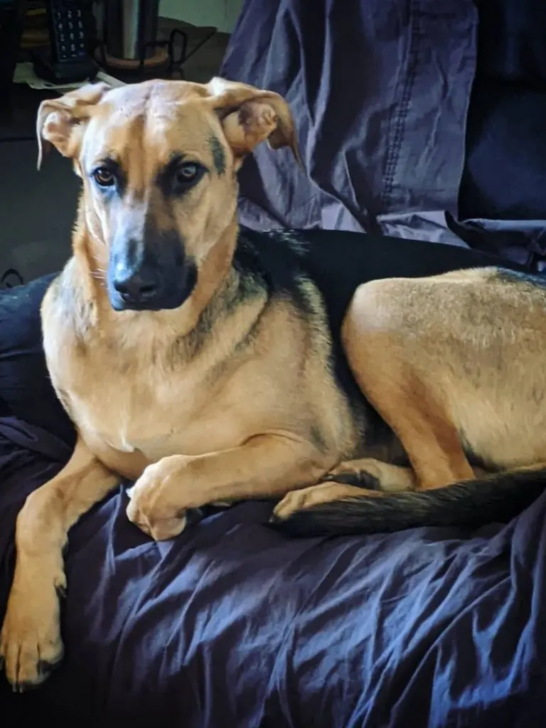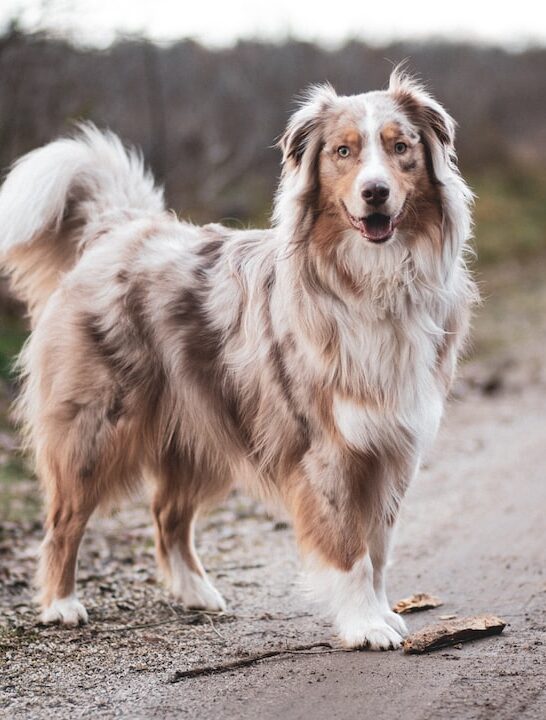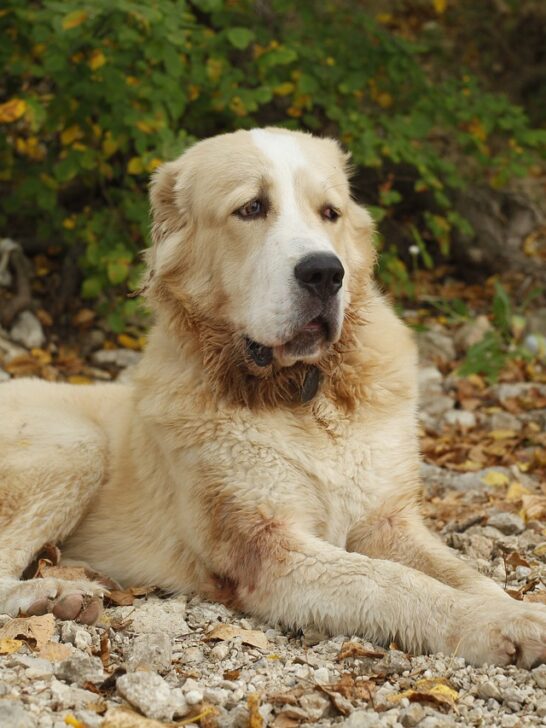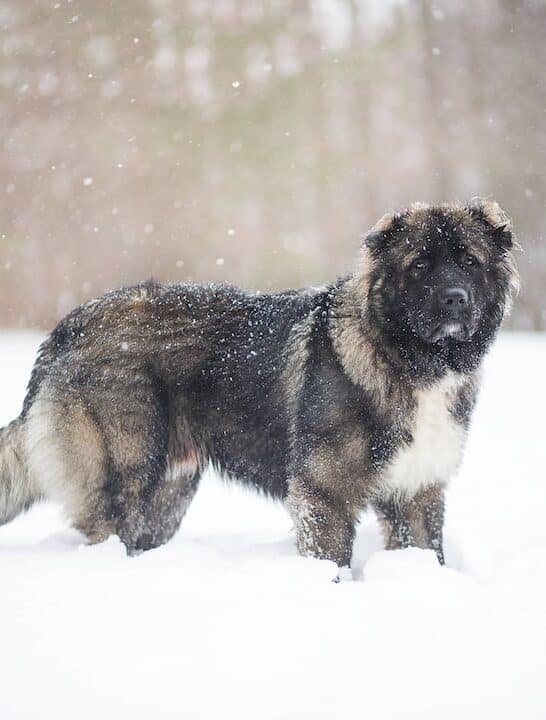Can German Shepherds Live In Apartments: What to Know About Big Dogs In Small Spaces
There is no getting around this one simple fact. Bigger dogs need bigger things.
When you bring a big dog like a German Shepherd into your life, you can count on also having to add a big dog bed, big dog crate, big dog food bags, and more.
But does a big dog like a German Shepherd necessarily need to live in a bigger space? That is the important question we are going to look at in this article.
Can German Shepherds Live In Apartments?
The short and simple answer to the question of whether GSDs can live in apartments is “yes.”
The bigger and better question, however, is whether German Shepherds can happily live in a small space like an apartment.
Here, it may surprise you to know that the answer is also “yes” – but with some conditions.
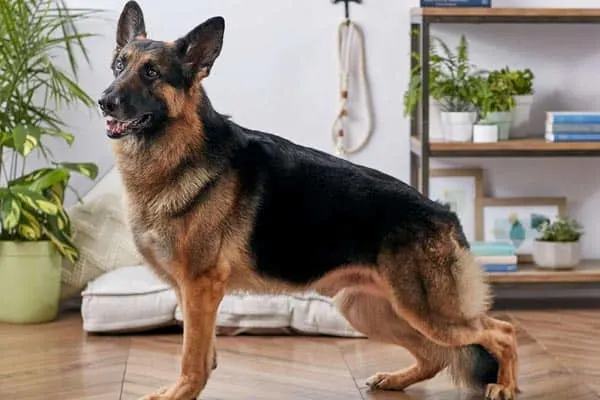
Learn From An Experienced Owner About GSDs in Apartments
Sometimes the best way to learn more about what it might be like to live with a German Shepherd in a small space like an apartment is to hear it from someone who is already doing it!
In this YouTube video, one couple shares their experience of living with, training, and exercising their German Shepherd in a tiny house, which is smaller than most standard apartments today.
This video also gives you helpful tips about how to set up your space and your day to make sure your GSD stays happy and healthy.
What to Know About German Shepherds Living in Apartments
As this popular German Shepherd owner forum highlights, there are lots of GSDs living with their human carers all over the world in apartment spaces.
Just as not all German Shepherds are the same, so too not all apartments are the same.
Some apartments are very dog-friendly while others are not.
Some apartments even offer enclosed dog park areas where dog owners can take their pups for potty time and play. Others offer no such amenities.
Some apartments may be conveniently located next to large open spaces or large dog parks, and this can make playtime and exercise so easy and convenient.
But other apartments may be located in densely populated areas where green space is hard to find.
As you are probably starting to suspect, the key to successfully living with a German Shepherd in a small space like an apartment is making sure your dog gets their activity needs to be met no matter what.
As long as you have the time and interest to take your dog for walks, have play sessions, and thoroughly tire your German Shepherd out each day, it really doesn’t matter if the place you both come home to is enormous or tiny.
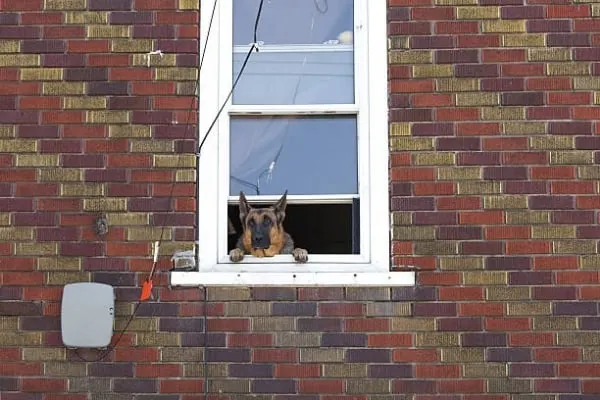
Does Your Apartment Building Allow German Shepherds?
As Apartments.com points out, the very first question you need to ask is whether your apartment management even permits German Shepherd dogs on the premises.
Just as some cities and municipalities may ban or restrict keeping certain dog breeds over concerns about breed aggression issues, sometimes apartments may institute their own rules about which dog breeds are permitted on the property.
German Shepherds are frequently employed in K-9, military, police, guarding, and protection work.
This sometimes lands the GSD on the shortlist of “aggressive” dog breeds and earns them a ban from apartment managers or local governments.
It is worth checking on this in advance to avoid hefty fines and heartbreak.
If your apartment management is open to allowing you to add a German Shepherd dog to your family, you may need to pay an extra pet deposit or provide a certification of rental insurance before being allowed to move in.
In some cases, the landlord’s own insurance policy may prohibit certain dog breeds from coming onto the property. If this applies, there may not be anything you can do.
The management may also require extra proof that your GSD has the appropriate temperament and training to fare well in a multi-home building where interactions with other tenants and their pets are inevitable.
You may be asked (or required) to provide any or all of the following before you will be allowed to have a German Shepherd dog breed on the property:
- Certification of good health.
- Proof of all current vaccinations and pest control measures.
- Proof of neutering/spaying.
- Temperament test results.
- Veterinary reference.
- References from any past landlords.
Bringing along photos of your dog sweetly interacting with people of all ages and other pets may get you extra points during this introductory process.
What If Your German Shepherd is a Service Dog?
The topic of true canine service animals is a heated one today as the line between service dogs and emotional support dogs becomes increasingly blurred.
However, the Americans with Disabilities Act (ADA) and the Fair Housing Act (FHA) are both crystal clear that any tenant who has a documented medical need for a service dog must be allowed to live with their dog on the premises, even if that apartment complex does not permit dogs.
In order to qualify as a true service animal, your German Shepherd must be trained to do specific work that assists you with a health disability.
These laws can get very complex and may vary from one city, town, or municipality to the next regarding whether the ADA or FHA or both require acceptance of a service dog along with that dog’s owner in a housing situation.
However, one thing that remains consistent and clear is that the service dog must be under the handler’s (owner’s) control at all times.
This means there is the expectation that a service animal will not act out, display aggression, or cause problems for other tenants because of behavioral issues.
Even dog breeds that are prohibited from the apartment complex or the local region are permitted when the dog is a legitimate service animal.
However, the dog must be fully trained before moving in – no service dogs in training are covered under these laws.

Will Your German Shepherd Fit Into Your Apartment?
According to the American Kennel Club (AKC), the German Shepherd dog breed is currently ranked as the second most popular companion canine (after the unbeatable Labrador Retriever and ahead of 193 other registered dog breeds).
According to Builder Online, two out of every 10 Americans live in an apartment setting.
What does this add up to?
It is highly likely there are many, many German Shepherds living with their human keepers in apartments all over the country right at this very minute.
But what is less well known is how comfortable that arrangement is for all concerned.
The AKC considers the German Shepherd dog to be a true large dog breed.
The typical adult German Shepherd will weigh between 50 and 90 pounds and stand anywhere from 22 to 26 inches tall (paw pads to shoulder girdle).
That is a whole lot of dog to fit into a one-bedroom apartment, for example.
Apartment Therapy states that the typical one-bedroom apartment may range from 400 to 1,000 square feet depending on the city.
In many ways, adding a 50 to a 90-pound dog will be the equivalent of adding a small child in terms of the extra space required.
Especially if you plan to crate-train your GSD (a smart idea for a variety of reasons).
The footprint of the dog crate alone will take up at least five feet by five feet of floor space – about four feet of a crate and another foot of space for entry/exit and air circulation.
If you add a dog bed, you can count on another four to five feet of floor space needed. Plus you will need to plan for where you are going to store your dog’s food, treats, toys, and supplies.
Doing a walk-through of your available space can tell you more about the best place to put your dog’s personal items as well as how feasible that is going to be.
One big mistake many apartment dwellers make when choosing a GSD dog is only planning for the size of their new puppy.
A German Shepherd puppy at nine weeks old might only weigh 20 to 30 pounds and be just an adorable little fuzzball of cuteness.
But your dog won’t stay that way for long. Expect your puppy to double in weight every three months until at least nine months of age and continue to grow even after that.
German Shepherds can take longer to mature because they are large breed dogs.
This means you may not actually have a good working idea of just how large your dog is going to be until after the one-year mark.
Meeting your dog’s parents can help a lot in estimating your puppy’s adult size, but even this is not a guarantee.
Of course, if you are able to get a larger apartment – even one with two bedrooms – the problem of available floor space will be greatly eased.
Rental Agreement Considerations for a German Shepherd in an Apartment Space
Another factor to consider before moving forward to live with a German Shepherd in an apartment is the issue of safe play.
As Blue Angel German Shepherd Dog Rescue (BAGSDR) charity points out, German Shepherds as a breed were developed to work.
This is a dog breed that fully expects to get up and “go to work” just like you do every day!
GSDs began their breed evolution as herding and livestock guarding dogs.
When this job description was no longer in high demand, German Shepherds moved into K-9, guarding, and protection work.
Today, German Shepherds are found in fields as diverse as tracking and hunting, service and therapy, guide dogs for the blind, nose work and search and rescue as well as many canine athletic disciplines.
Schutzhund, obedience and rally, agility, dock diving, you name it, these dogs can do it and will do it happily and tirelessly.
A German Shepherd that doesn’t have a job to do and people to do it with will find their own job to do, even if that means remodeling your crown molding or couch cushions.
You need to think about the terms of your lease agreement and the penalties for structural damage inside your unit.
Teething puppies may readily chew on baseboards, doors, or cabinetry built-ins.
Adult German Shepherds who get bored, are left home alone or experience separation anxiety may be far more destructive.
Can you foot the bill for repairs or damages your dog may cause inside your unit?
What kind of impact will it have on your finances if you lose part or all of your security deposit due to your dog’s presence?
These are important questions to ask yourself before making the commitment to sharing your apartment with a German Shepherd puppy or adult dog.
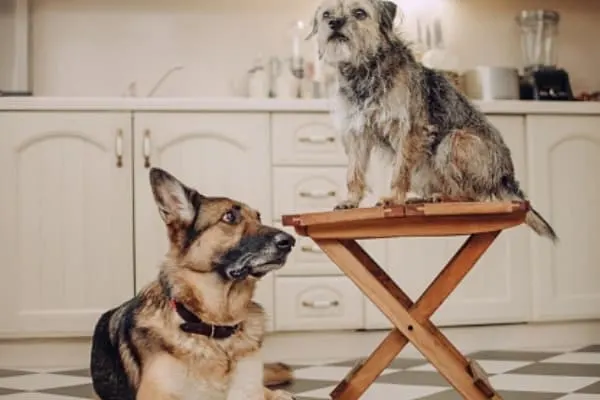
What About Safe Play Inside an Apartment Space?
Whether due to inclement or seasonal weather, your own health, or simply enjoyment of life together, it is also important to ask if your particular apartment unit will allow for safe play with your German Shepherd.
Even if you live in a very temperate climate and you have easy access to local dog-friendly parks or trails, there may be days when you want or need to stay indoors.
Your dog will still need the same level of daily activity to dwell easily in such a small space.
So this may mean you are throwing a ball or playing tug-of-war inside your apartment to tire your dog out.
Taking a look at the layout of your apartment and the size of each room will give you a good idea of how hard or easy it might be to play with your German Shepherd safely and easily indoors.
German Shepherds Are Known to be “Talkers”
Yet another consideration many first-time German Shepherd owners do not even think about is the breed’s well-known (and well-deserved) reputation as “talkative.”
The German Shepherd is a very intelligent, expressive, and sensitive dog breed. This is not unusual, however. Many working dog breeds display similar traits.
As Science Alert highlights, German Shepherds are ranked as the third smartest dog breed out of 79 purebred dog breeds.
The type of canine smarts being measured in this study relates to how quickly a dog breed can master a new command and how frequently they will obey that command in the future.
The German Shepherd can master a new command in five tries or less and will reliably repeat the behavior on cue as often as 95 percent of the time.
This points back to the breed’s long evolution as a dog that works closely side by side with a human partner.
GSDs are incredibly attuned to “their” people and are known for “talking” throughout the day (and sometimes in the night) by whining or crying.
While this is adorably cute in a GSD puppy and can be endearing to devoted dog owners even in adulthood, it is far less likely to be well-received by your near apartment neighbors.
How will your neighbors react when your German Shepherd starts whining or whimpering or crying – or even worse, barking and howling – because you have left the house and your dog is alone, bored, and lonely?
Will your neighbors tolerate it when your GSD reminds you about every meal, snack, walk, and training session with a piercing whine?
What about the not-insignificant thudding of your dog’s tail on the floor or footfalls as your GSD walks around the apartment? Will your below-neighbors be disturbed?
Some neighbors may be very accommodating or may not even be home enough to notice.
But other neighbors who are noise-sensitive or home a lot may complain and cause trouble for you in the apartment complex.
Before you get a German Shepherd, it can be wise to talk with your near neighbors below, above, and side to side to find out if there are any concerns you should be aware of.
This is especially true and important if you really like where you live and want to stay long-term.
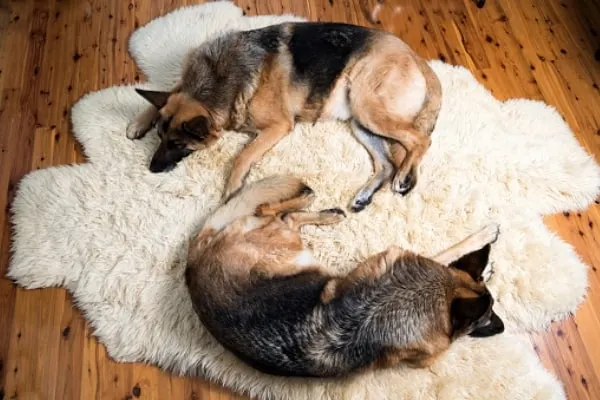
What a German Shepherd Will Need to Live Happily in an Apartment
The key to living happily and peacefully with a German Shepherd in any small space is to be able to meet your dog’s daily mental and physical stimulation and activity needs in creative ways.
Because GSDs are so mentally intelligent as well as physically athletic, they have needs on multiple levels.
If you want a tired German Shepherd that sleeps soundly at night and is quietly self-contained when you are all inside your apartment together, then you need to be the one who is tiring your dog out!
When your vet clears your dog for more physical exertion (typically at or after the age of 12 to 18 months or whenever X-rays show your dog’s growth plates have fully closed and fused), you will need to find room in your schedule for plenty of exercises.
An adult GSD with a fully mature skeletal system will need one to two hours of vigorous exercise, activity, and playtime on a daily basis to be a quiet and calm housemate inside your apartment, according to German Shepherd Rescue of Orange County.
Earlier than that, you will want to provide 30 to 60 minutes of moderate training, exercise, and interactive playtime per day to achieve the same result.
That being said, some German Shepherds may have a higher energy level than others, which may mean your particular dog needs less exertion than this or more every day.
The key is to identify in advance where and how you will meet your dog’s needs.
Apartment-Friendly German Shepherd Exercise and Activity Ideas
Since mental stimulation is just as important as physical exertion to truly tire your dog out each day, the best activity schedule is one that can combine both.
Here are some great keeper-generated ideas for how to make sure your dog is getting all of their daily mental and physical exercise needs met even when you live in an apartment together.
- Break up walks into several smaller sessions daily.
- Start with a period of training commands.
- Introduce new tricks to training every week.
- Visit the local dog park or any dog-friendly park or beach together.
- Head to the local jogging track or outdoor sports stadium.
- Go hiking or walking together after work or on weekends.
- Enroll in canine athletics together (Schutzhund, dock diving, and rally are all great).
- Teach your dog to do a job so you can volunteer together (therapy dog, visiting the elderly, reading to kids – all these give your dog plenty of human interaction).
- Enjoy time at a local pond, river, bayou, or lake – GSDs typically love to swim.
- Create a scavenger hunt in your home using snuffle mats, treat balls, remote communication, and treat dispensers and other sensory fun.
- Make time for tug-of-war, fetch, and your GSD’s other favorite interactive games every day.
- Turn mealtimes into mental mastery sessions with canine puzzle toys that have varying levels of difficulty for your dog to master.
- Ask your employer about taking your German Shepherd dog to work with you.
- Get involved in your local chapter of the German Shepherd dog club and organize play dates for your dog with other German Shepherds.
- Start entering competitions on the show dog circuit or enroll in agility competitions.
- Work with a professional dog trainer together to help your dog learn new skills.
By understanding the special challenges and needs of a large, intelligent, people-focused dog breed like the German Shepherd, you can prepare to make any size living space work for your dog’s daily needs.
With enough advance preparation, German Shepherd dogs make great apartment dogs – wherever you are is where they want to be.















